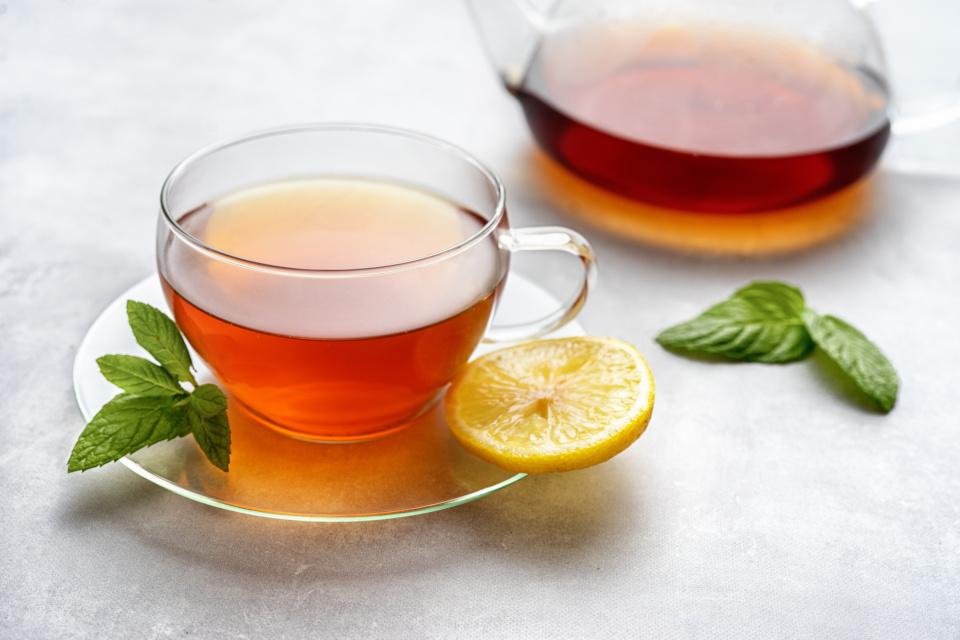Your Daily Habit May Be Protecting You
Hi Everyone. I love tea! I also love it for its anti-inflammatory and gut health properties. It has been known for a long time that tea has medicinal properties, and evidence grows stronger with each study about how the world’s most widely consumed beverage’s amazing benefits for a whole host of health conditions.
A recent report from the Annual Meeting of the European Association for the Study of Diabetes indicates that if you drink around four cups of tea a day, you are doing yourself a favor by reducing the risk of developing Type 2 diabetes!
There is a multitude of scientific studies that state that tea aids diabetes management. So, I decided to delve deeper into this post.
Why not make yourself a cup of tea and have a read?
What Makes Tea a Tea?
What Are The Nutrients In Tea?
What Is the Study About Drinking Tea and Diabetes?
How Does Tea Aid Diabetes Management?
Why Does Tea Make Everything Better?
How Much Tea Is Good For You?

What Makes Tea a Tea?
Whether black, green, oolong or so on, it comes from the Camellia sinensis bush, an evergreen shrub.
Herbal tea comes from flowers, bark, spices, and dried fruits and may have some black and green tea in there. These have health properties, too, but this post is about tea from the Camellia.
The composition of tea differs with its leaves, climate, season, and horticultural practices; each differing process affects the chemical composition.
The excellent taste of tea is all down to the growing conditions, leaves storage, fermentation process, and what it is exposed to. Which is why there are so many depths of flavors and aromas. This cultivation causes the tea to have a positive effect on your health.

What Are The Nutrients In Tea?
The cultivation regions and process of tea create bioactive compounds called catechins.
Catechins then form complex health-giving theaflavins and other compounds during fermentation. This unique chemical composition is responsible for the amazing taste, aroma, and color, too.
Tea is such a rich source of nutritional molecules, including phenolic compounds and powerful antioxidants, polysaccharides, proteins, amino acids, fiber, carbohydrates, lipids, and minerals.
What Is the Study About Drinking Tea and Diabetes?
There are 422 million diabetes sufferers worldwide (and it is climbing!). In the last three decades, the prevalence of diabetes has risen dramatically, and according to recent projections, it will continue to grow to a whopping 629 million by 2045.
What is really alarming is that there is a massive trend of diabetes in children and teenagers! It is such a serious issue.
Type 1 diabetes is not preventable and is treated by insulin.
Type 2 diabetes is preventable and can be reversed by lifestyle factors. For instance, reducing inflammation, which plays a vital role in glucose and lipid metabolism pathology, eating the right foods, exercising, and managing insulin.
The study report at the ESDA came from China and relied on 19 cohort analyses of over 1.1 million adults from eight countries, including the UK, USA, Europe, and Asia.

They found a ‘significant linear association’ between drinking tea and a reduced risk of developing diabetes.
People who drank 1-3 cups of tea a day, compared to people who didn’t drink tea, had a 4% reduced risk of developing diabetes. The risk was reduced even further if they drank four or more cups of tea daily.
The conclusion was that drinking four cups or more a day reduces the risk by 17% of developing Type 2 diabetes. The effects were consistent with everyone.
“Our results are exciting because they suggest that people can do something as simple as drinking four cups a day to potentially lessen their risk of developing Type 2 diabetes.” – Lead author Xiaying Li from the Wuhan University of Science and Technology in China.

How Does Tea Aid Diabetes Management?
So, as I mentioned before, tea (black, oolong, and green) has many health benefits. One reason why I love it so much is that it improves intestinal flora and has anti-inflammatory effects.
Regarding diabetes management, the phenolic compounds, polysaccharides (TPS), and amino acid L-theanine in tea are responsible for the physiological effects. Without getting too scientific and delving into subgroups (8,000 phenolic compounds), I will refer to the phenolic compounds as polyphenols.
Polyphenols are a rich source of pharmacologically active molecules.
Polyphenols, which are bioactive compounds in many fruits, vegetables, drinks, legumes, nuts, and spices, are being recognized for their antioxidant properties and involvement in many powerful enzymatic and cellular mechanisms in the body.

Some tea polyphenols connected with reducing the onset and progression of diabetes are quercetin, kaempferol, myricetin, theaflavin, thearugibin, and catechins (mainly EGCG – epigallocatechin-3 gallate).
In countless experimental studies, these three teas were proven to protect against the onset of diabetes mellitus and diabetic complications in a powerful way.
The tea produces anti-hyperglycemic activity and improves insulin resistance, activating the insulin signaling pathway, playing an insulin-like role, improving oxidative stress, and alleviating the inflammatory response.
Tea is also shown to protect the kidneys in people with diabetes, diabetic eye conditions, and cardiovascular complications in diabetes.

Polyphenols and polysaccharides have beneficial effects on glucose homeostasis, decreasing hyperglycemia and improving acute insulin secretion and sensitivity.
L-theanine is also a potent stimulator of insulin activity. It is effective in giving partial protection to pancreatic cells when your antioxidant levels are low (oxidative stress).
Oxidative stress is when there is an imbalance of free radicals and antioxidant defenses in your body, hence the need for antioxidants.
There is so much to say about the powers of the properties in tea!
There is enough evidence to back up the claims that tea does affect diabetes management.

Without a doubt, lifestyle modification plays a vital role in the ultimate solution to the problem of diabetes. Likewise, in the prevention of diabetes.
Do note that there must be a multitude of nutrients and lifestyle tweaks for optimum health to be achieved.
Numerous factors that could cancel out the benefits of any compounds need to be addressed. This is why Eat Burn Sleep successfully prevents, treats, and manages diabetes.
If you are looking to lower your cholesterol, please check this article.
Have you read: Is the Keto Diet Good For Diabetes?
Click here for a delicious Eat Burn Sleep polyphenol-rich recipe: Roasted Jerusalem Sunchokes With Salsa Verde!
Why Does Tea Make Everything Better?
There are so many good reasons to drink tea!
The next time you have a cup of tea (if you are not having one now), note the aroma, taste, and color.
It’s the polyphenols that are responsible for those, too. I love the distinctive aroma of different teas.
You may know that our sense of smell has an intense effect on what we crave. I have only to smell the maltiness or the earthiness in tea, and I want a cup.

Of course, it is also associated with sitting down and relaxing (which lowers the stress hormone cortisol)—or socializing, meeting someone for a cup of tea. Taking your time and pouring the pot until every drop has gone is a lovely ritual.
Memories make that craving stronger. We associate tea with pleasure and reward, which then releases dopamine, which further boosts your health.
Of course, we know that tea improves intestinal flora, too. Plus, when you relax, you contribute to your gut microbiota by following an anti-inflammatory lifestyle (not loading your tea with sugar and eating a high-fat meal with your cup of tea, of course).
So, since 70% of neurotransmitters are produced in a healthy gut, you are also creating more ‘feel good’ ones, which are essential for mental well-being. Good gut health is good for your mental health.
A consistent increase in serotonin and dopamine production is associated with lower rates of depression!
Check out this post: 4 Secrets to Feeling Good!
Not only that, but the amino acid L-theanine in tea promotes relaxation.

So, sitting down with a cup of tea with someone that you love being with will reduce your inflammation, make you feel happier, and assist in managing conditions such as diabetes.
How Much Tea Is Good For You?
Again, it is all about moderation; up to four cups are enough. Though some studies suggest more, it depends on dosage (and how big your cups are!).
Too much could exert adverse effects, and I always advocate that moderation is the best way.
After all, tea does contain caffeine. This could have diuretic effects (and effects on sleep) if you have too much. Some people have more sensitivities to it than others, which could affect the nervous system.
Because of the tannins, tea could also inhibit iron and other nutrient absorption.
It also matters how you take your tea because I am referring to neat, unadulterated tea without sugar and milk since additional ingredients will alter the composition.
Also, some research suggests that if you take dairy milk in your tea, the fat in the milk may reduce the antioxidant capacity. This makes sense because flavonoids deactivate when they bind with proteins.

So, those regular tea breaks are essential!
You may look at your daily cuppa differently and even go so far as to put its benefits on your gratitude list.
Needless to say, from these studies, if you like tea and have Type 2 diabetes, you can relax and enjoy four neat cups daily.
Tea, without sugar, is suitable for almost everyone. How do you take yours?
I wish you a wonderful day!


